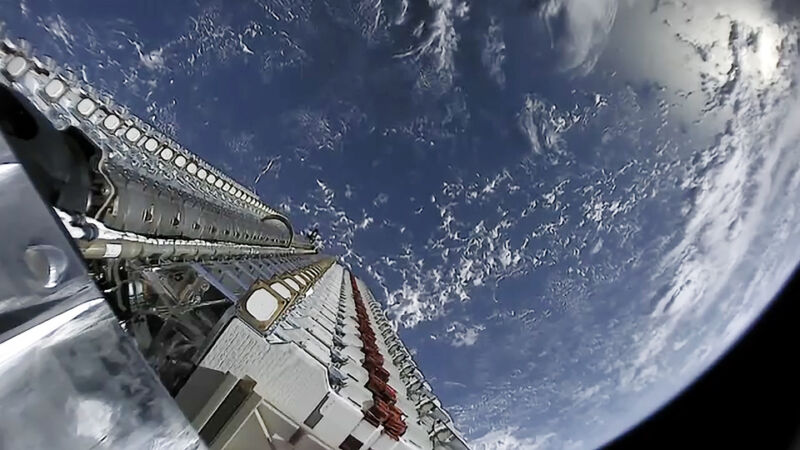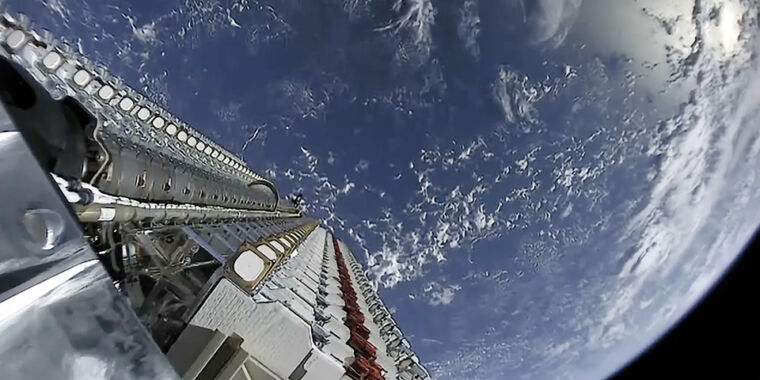
A Russian diplomat said civilian satellites could be legitimate military targets in a statement that appears to refer to Starlink providing broadband access in Ukraine. Civilian satellites “could become a legitimate target for retaliation,” the Russian official said in a statement to the United Nations’ open working group on mitigating space threats.
The quote comes from an unofficial English translation of the September 12 statement by Konstantin Vorontsov, head of the Russian delegation to the United Nations Office on Disarmament (UNODA) Working Group. The translation features statements from other countries from the session on the UNODA meeting website.
Vorontsov said:
We want to underline an extremely dangerous trend that goes beyond the harmless use of space technologies and that has become apparent during the events in Ukraine. Namely, the use by the United States and its allies of the elements of civil, including commercial, space infrastructure for military purposes. It seems that our colleagues do not realize that such actions are in fact indirect involvement in military conflicts. Quasi-civilian infrastructure can become a legitimate target for retaliation.
SpaceX’s Starlink division sent satellite terminals to Ukraine after the Russian invasion of the country disrupted broadband networks, with the US funding the effort. Satellite Internet access has been helpful in Ukraine’s military operations against Russian forces.
Vorontsov’s statement went on to claim that the use of civilian satellites could violate the Outer Space Treaty:
The actions of Western countries needlessly endanger the sustainability of peaceful space activities, as well as many social and economic processes on Earth that affect people’s well-being, especially in developing countries. This provocative use of civilian satellites is questionable to say the least under the Outer Space Treaty, which provides for the exclusively peaceful use of space, and must be strongly condemned by the international community.
Russian news agency Tass identified Vorontsov as acting deputy director of the Ministry of Foreign Affairs for Non-proliferation and Arms Control in October 2021, but he no longer holds that position.
SpaceX CEO Elon Musk warned in March of a “high” chance that Russia will attack Starlink equipment in Ukraine, though he referred to the user terminals on the ground rather than satellites in space. A Russian cyber attack was able to temporarily disrupt Viasat’s satellite service when the war started.
Musk later reported that Starlink resisted Russian jamming and hacking attacks. The then chief of the Russian space agency Dmitry Rogozin criticized Musk for helping Ukraine.
Russian anti-satellite missile test was condemned
Russia conducted an anti-satellite missile test in November 2021. “After that, US officials condemned shooting the two-ton satellite at an altitude of less than 500 km, which is high enough that debris will remain in orbit for at least the next five to 10 years and could pose a threat. for many valuable assets, including the International Space Station,” an Ars article said at the time.
A Space.com article today on Vorontsov’s comment notes that “Russia’s statement to the UN-OEWG on space threats comes just one day after two more countries, Germany and Japan, pledged no destructive anti-satellite (ASAT) tests.” joining a chorus of countries including the United States, Canada and New Zealand committed to reducing space debris following a November 2021 Russian test that drew widespread international condemnation. Russia has not yet made such a promise .”
In April, Vice President Kamala Harris said the US “commits not to conduct destructive tests with direct-takeoff anti-satellite missiles” and called on all other countries to follow suit. “Put simply, these tests are dangerous and we will not conduct them,” Harris said.
Attacking Starlink in space wouldn’t be easy, as SpaceX has launched more than 3,000 satellites and is seeking permission to eventually launch tens of thousands.
The Space.com article notes that Starlink is not the only satellite operator to provide important services in response to Russia’s war against Ukraine. “In addition to Starlink, commercial satellite imaging firms such as Planet, Maxar and BlackSky have provided crucial information by taking photos of the conflict from above and sharing them openly, playing an unexpectedly important role during the Russian invasion,” the article said.

